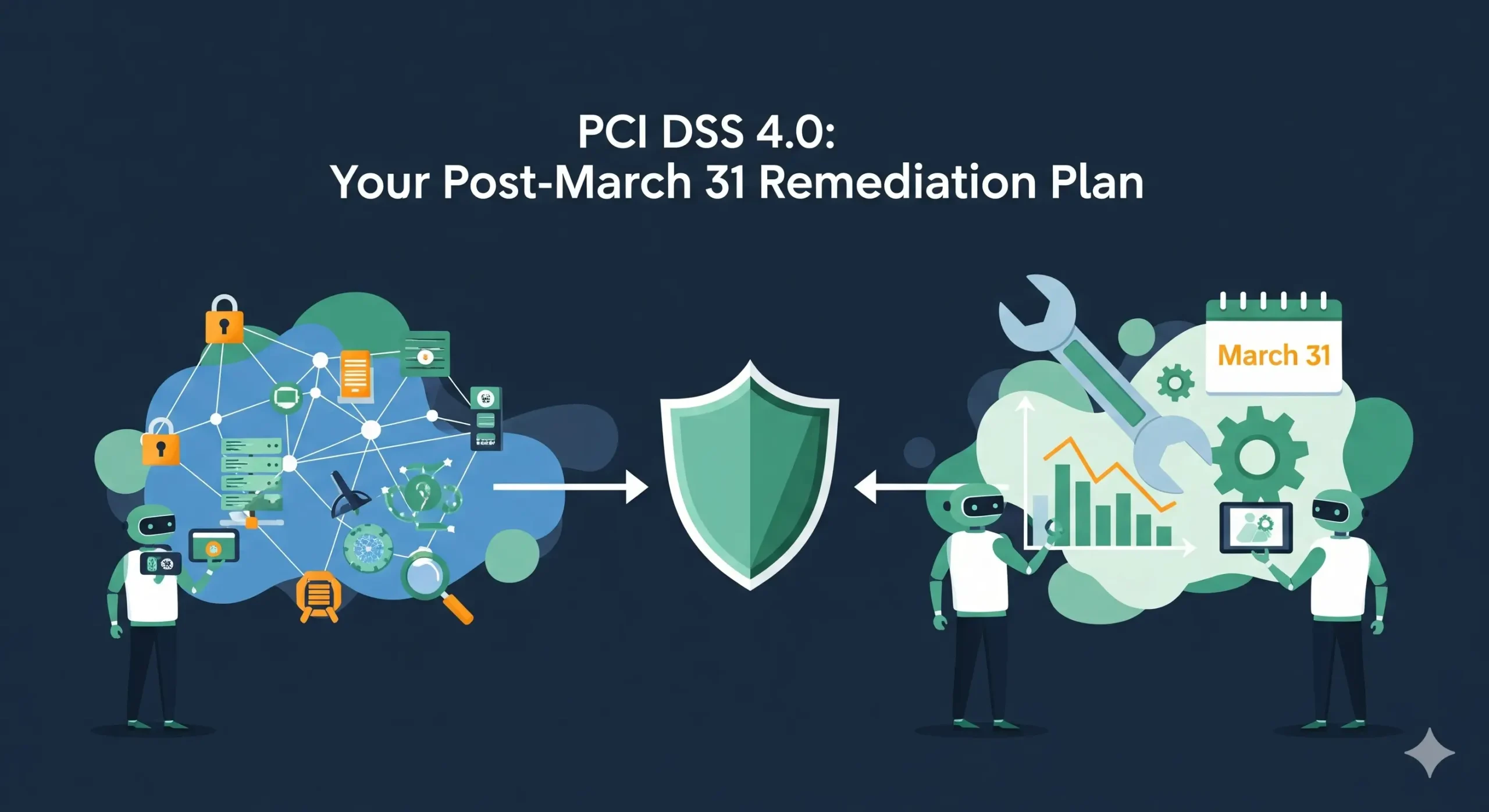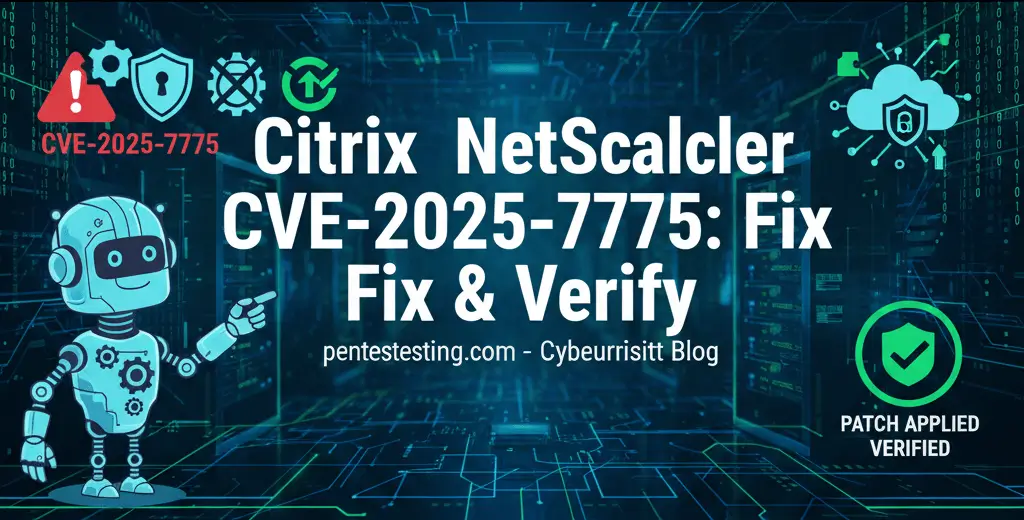7 Proven Patch/Update Fixes for NIST SP 800-53 5.2
NIST SP 800-53 5.2 (Aug-2025) sharpened expectations around patch/update integrity. Auditors will probe how you verify signed updates, prevent tampering, and rollback safely—with evidence. This guide shows exactly how Pentest Testing Corp builds and proves these controls in live environments.
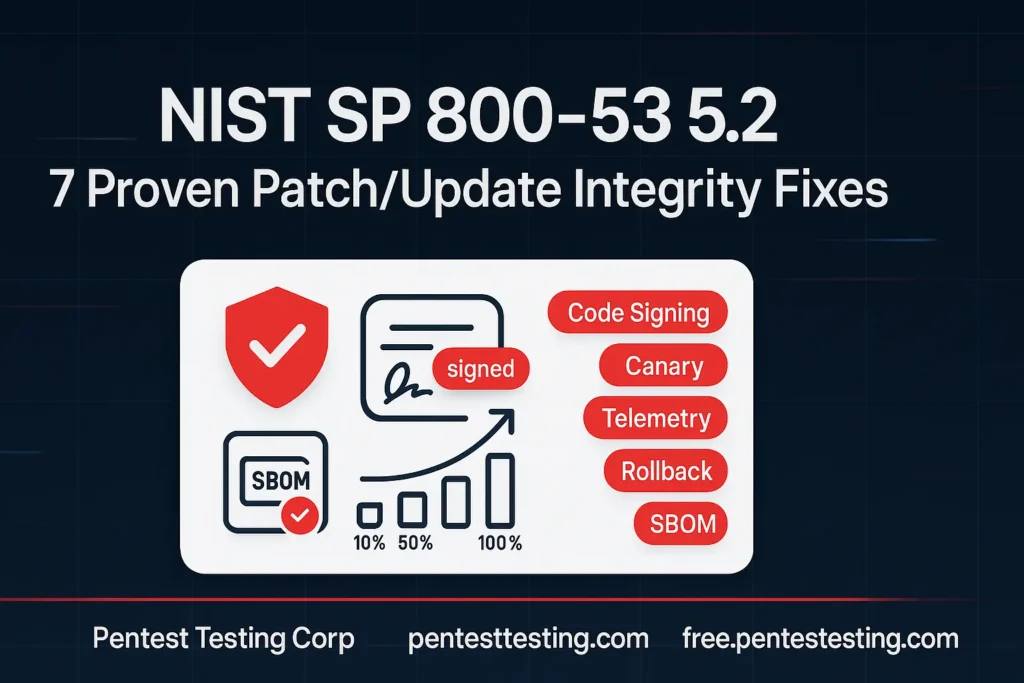
Preparing for cloud switching & portability? Read our EU Data Act remediation: 60-Day Rapid Fix Plan.
What changed in 5.2 (and why it matters)
Expect increased scrutiny on controls that affect the software update supply chain and operational integrity—for example:
- SA-24 (e.g., integrity of acquired components/updates)
- SA-15(13) (e.g., update authenticity verification and tamper resistance)
- SI-02(07) (e.g., controlled, monitored, and reversible updates)
Auditors will ask for proof that:
- Updates are cryptographically signed and verified before install,
- Rollouts are staged/canary-based with telemetry and automatic halt, and
- Rollback plans are rehearsed and evidenced.
Our remediation blueprint (field-tested)
Below are 7 proven fixes we implement—and the artifacts we produce so you can pass audits with confidence.
1) Enforce code signing: OS, containers, firmware
Windows (MSI/EXE) — block unsigned or untrusted chain:
# PowerShell: verify Authenticode before install
param([string]$Path)
$si = Get-AuthenticodeSignature -FilePath $Path
if ($si.Status -ne 'Valid' -or $si.SignerCertificate.Thumbprint -notin @(
'A1B2C3D4E5F6...','0FABEAD1...'
)) {
Write-Error "Blocked: invalid or untrusted signature for $Path"
exit 1
}
Start-Process msiexec -ArgumentList "/i `"$Path`" /qn" -Wait -NoNewWindowRHEL/Debian — verify package signatures before install:
# RPM: ensure GPG verification ON
sudo sed -i 's/^gpgcheck=.*/gpgcheck=1/' /etc/yum.conf
sudo rpm --checksig ./update.rpm
# DEB: enforce signed APT repos and packages
sudo apt-get update -o Acquire::AllowInsecureRepositories=false
dpkg-sig --verify ./update.debContainers (OCI) — verify provenance with cosign:
# Verify image signature and expected certificate subject/issuer
COSIGN_EXPERIMENTAL=1 cosign verify \
--certificate-identity-regexp 'ci@your-org\.com' \
--certificate-oidc-issuer 'https://token.actions.githubusercontent.com' \
ghcr.io/your-org/your-app:1.4.2Evidence we capture: signed-install logs, verification screenshots, trust store exports, and policy baselines.
2) Lock down the management plane (OOB + ACLs/VPN-only)
- Put update endpoints off the public internet, reachable only via VPN or Privileged Access Workstations.
- Enforce just-in-time (JIT) admin with short-lived credentials.
# Example: only allow VPN CIDR to reach update service
iptables -F
iptables -A INPUT -p tcp --dport 8443 -s 10.8.0.0/24 -j ACCEPT
iptables -A INPUT -p tcp --dport 8443 -j DROPEvidence: network ACL diffs, VPN policies, PAM/JIT approval logs.
Free Website Vulnerability Scanner Tool homepage
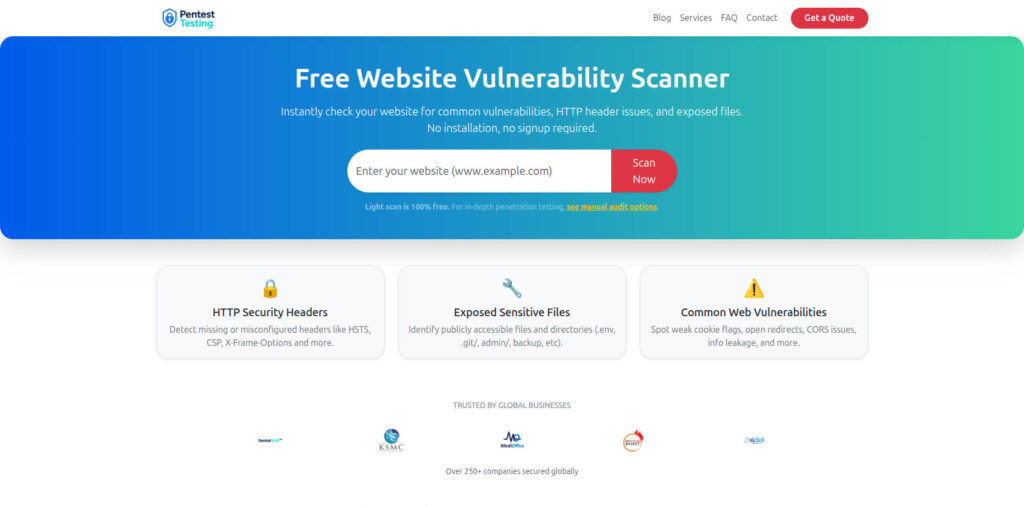
3) Stage rollouts with progressive delivery & kill-switch
Start with 10% canary, monitor health, then expand.
# Kubernetes: simple two-step canary using separate Deployment
apiVersion: apps/v1
kind: Deployment
metadata: { name: app-canary }
spec:
replicas: 1
selector: { matchLabels: { app: myapp, track: canary } }
template:
metadata: { labels: { app: myapp, track: canary } }
spec:
containers:
- name: app
image: ghcr.io/your-org/app:1.4.2
readinessProbe: { httpGet: { path: /healthz, port: 8080 } }
---
apiVersion: apps/v1
kind: Deployment
metadata: { name: app-stable }
spec:
replicas: 9
selector: { matchLabels: { app: myapp, track: stable } }
template:
metadata: { labels: { app: myapp, track: stable } }
spec:
containers:
- name: app
image: ghcr.io/your-org/app:1.4.1Kill-switch: one command to halt/rollback.
# Halt rollout if error rate > threshold
if (( $(curl -s http://metrics/api/errors_rate) > 0.02 )); then
kubectl scale deploy/app-canary --replicas=0
kubectl rollout undo deploy/app-stable
fiEvidence: rollout timeline, health dashboards, halted-rollout logs.
4) Instrument update telemetry + immovable logs
Capture who/what/when every time an update is proposed, approved, deployed, or rolled back.
-- Minimal evidence schema
CREATE TABLE update_events(
id BIGSERIAL PRIMARY KEY,
ts TIMESTAMPTZ NOT NULL DEFAULT now(),
env TEXT, component TEXT, version TEXT,
actor TEXT, action TEXT, signature_thumbprint TEXT,
provenance_sha256 TEXT, result TEXT, notes TEXT
);// KQL: alert on unsigned install attempts
UpdateEvents
| where action == "install_attempt" and isnull(signature_thumbprint)
| summarize count() by bin(ts, 1h), componentEvidence: signed, WORM/immutable logs; SIEM alerts; reviewer approvals.
5) Make rollback real (and rehearsed)
# Ansible: snapshot before update; auto-rollback if health check fails
- hosts: appservers
tasks:
- name: Snapshot VM
community.general.proxmox_kvm:
api_user: "{{ user }}"; api_password: "{{ pass }}"
vmid: "{{ inventory_hostname }}"
state: snapshot; snapname: pre_update_{{ ansible_date_time.epoch }}
- name: Install signed update
ansible.builtin.command: /usr/local/bin/install_signed.sh {{ pkg }}
- name: Health check
uri: url=http://{{ inventory_hostname }}:8080/healthz status_code=200 register=hc
- name: Rollback if failed
when: hc.status != 200
community.general.proxmox_kvm:
vmid: "{{ inventory_hostname }}"
state: rollback; snapname: pre_update_{{ ansible_date_time.epoch }}Evidence: change tickets, snapshots, and documented recovery time from drills.
6) Demand supplier attestations (prove what you ship)
Require vendors (and internal teams) to attach provenance and policy-based attestations.
{
"component": "billing-service",
"version": "1.4.2",
"builtBy": "GitHub Actions",
"provenance": "sha256:5e1f...c9a",
"policies": {
"signedArtifacts": true,
"sastPassed": true,
"depsApproved": true
},
"signatures": [{
"alg": "ecdsa-p256-sha256",
"cert_subject": "[email protected]",
"sig": "MEUCIQDf..."
}]
}Evidence: stored attestations, verifier logs, failed-policy blocks.
7) SBOM + VEX to speed triage
Maintain a CycloneDX SBOM per release and a VEX file to mark what is (not) affected.
// SBOM fragment (CycloneDX)
{
"bomFormat": "CycloneDX",
"specVersion": "1.5",
"components": [
{"name": "openssl","version":"3.0.14","purl":"pkg:generic/[email protected]"}
]
}// VEX fragment: not_affected due to configuration
{
"vulnerabilities": [{
"id": "CVE-2025-12345",
"status": "not_affected",
"justification": "component_not_present",
"notes": "Feature X disabled at build; dead code eliminated."
}]
}# Python: fail the pipeline if SBOM shows a vulnerable component without VEX relief
import json, sys
sbom = json.load(open("bom.json"))
vex = json.load(open("vex.json"))
vex_ids = {v["id"]: v["status"] for v in vex["vulnerabilities"]}
bad = []
for c in sbom["components"]:
if c["name"] == "openssl" and c["version"].startswith("3.0."):
if vex_ids.get("CVE-2025-12345","affected") != "not_affected":
bad.append("openssl 3.0.x requires VEX not_affected for CVE-2025-12345")
if bad:
print("\n".join(bad)); sys.exit(1)Evidence: SBOM/VEX files, pipeline logs showing “blocked until VEX provided”, and exception approvals.
Map fixes to audit evidence (cheat-sheet)
| Fix | What we implement | Evidence artifacts auditors accept |
|---|---|---|
| Code signing enforcement | Authenticode/RPM/DEB verification, OCI signature verify | Verification logs, trust store exports, policy docs |
| Management plane lockdown | VPN-only, ACLs, JIT admin | ACL diffs, VPN config, PAM/JIT logs |
| Staged rollouts | Canary + health SLOs + kill switch | Rollout timeline, SLO dashboards, halted-deploy record |
| Telemetry & logging | Immutable update events, SIEM alerts | WORM logs, alert IDs, reviewer approvals |
| Rollback plan | Snapshots, runbooks, drills | Drill reports, RTO/RPO metrics, snapshots |
| Supplier attestations | Provenance + policy claims | Attestation JSON, signature verify logs |
| SBOM + VEX | Per-release artifacts, policy gates | SBOM/VEX files, pipeline failure screenshots |
30-Day fast-track plan (aligned to NIST SP 800-53 5.2)
Week 1 – Gap review
- Run a quick exposure sweep with our free scanner → free.pentesttesting.com.
- Map your current update pipeline against the 7 fixes; open tickets with owners.
Week 2 – High-impact changes
- Enforce signing verification in CI/CD and package managers.
- Lock down update endpoints to VPN-only; enable JIT admin.
Week 3 – Rollouts & telemetry
- Implement canary rollout and health-based halt.
- Start immutable update_events logging and alerting.
Week 4 – Evidence & retest
- Drill rollback; capture artifacts.
- Generate SBOM/VEX and run a focused retest.
Need hands-on help? Start here:
- Risk Assessment Services → https://www.pentesttesting.com/risk-assessment-services/
- Remediation Services → https://www.pentesttesting.com/remediation-services/
- SOC 2 Remediation → https://www.pentesttesting.com/soc-2-remediation-services/
- PCI DSS Remediation → https://www.pentesttesting.com/pci-dss-remediation-services/
- ISO 27001 Remediation → https://www.pentesttesting.com/iso-27001-remediation-services/
Where SBOM/VEX fits your program (and when)
Introduce SBOM/VEX when you already have basic signing & rollout in place. SBOM without gated rollout turns into noise; with policy gates, it becomes a fast triage engine for vulnerabilities with clear remediation evidence.
Sample report by the tool to check Website Vulnerability
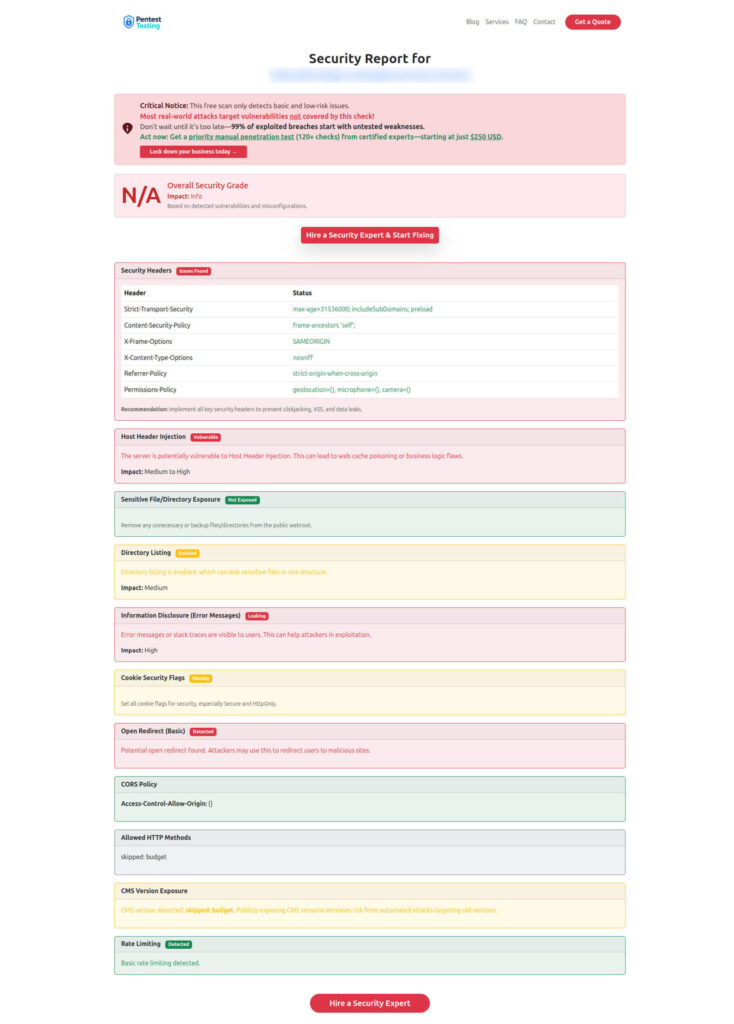
Recent blogs
- Recent blogs to deepen your rollout & evidence strategy:
ISO 27001:2022 Transition Playbook → https://www.pentesttesting.com/iso-27001-2022-transition-playbook/
DORA TLPT 2025: 7 Powerful Moves → https://www.pentesttesting.com/dora-tlpt-2025/
ASVS 5.0 Remediation: 12 Battle-Tested Fixes → https://www.pentesttesting.com/asvs-5-0-remediation/
CVE-2025-41244 VMware Remediation: 7-Step Rapid Plan → https://www.pentesttesting.com/cve-2025-41244-vmware-remediation/
Copy-paste policy snippets you can adapt
Windows Defender Application Control (WDAC) — allow only signed binaries:
<SiPolicy xmlns="urn:schemas-microsoft-com:sipolicy">
<VersionEx>1.0.0.0</VersionEx>
<SigningScenario Value="12" ID="Windows Components"> </SigningScenario>
<Allow Mode="Enabled"/>
<FileRules>
<FileRule Id="VendorSigners" FriendlyName="Trusted Vendors"/>
</FileRules>
<Signers>
<Signer Id="VendorA"><CertRoot Type="TBS" Value="A1B2C3..."/></Signer>
</Signers>
</SiPolicy>GitHub Actions — require signature & provenance before deploy:
name: verify-and-deploy
on: [workflow_dispatch]
jobs:
verify:
runs-on: ubuntu-latest
steps:
- uses: sigstore/cosign-installer@v3
- run: cosign verify --certificate-identity-regexp 'ci@your-org\.com' ghcr.io/org/app:${{ github.ref_name }}
deploy:
needs: verify
runs-on: ubuntu-latest
steps:
- run: ./scripts/deploy_canary.sh ${{ github.ref_name }}Linux — systemd unit to block unsigned local installs (example hook):
[Unit]
Description=Pre-install signature gate
Before=apt-daily.service yum-cron.service
[Service]
Type=oneshot
ExecStart=/usr/local/sbin/verify-signature-hook.sh
[Install]
WantedBy=multi-user.targetReady to make this audit-ready?
- Free exposure sweep: https://free.pentesttesting.com/
- Risk Assessment: https://www.pentesttesting.com/risk-assessment-services/
- Remediation (hands-on fixes + evidence): https://www.pentesttesting.com/remediation-services/
Questions or a tricky control to prove? Email us at [email protected]. We’ll turn your NIST SP 800-53 5.2 patch/update integrity gaps into clear fixes and artifacts—fast.
🔐 Frequently Asked Questions (FAQs)
Find answers to commonly asked questions about Patch/Update Fixes for NIST SP 800-53 5.2.
